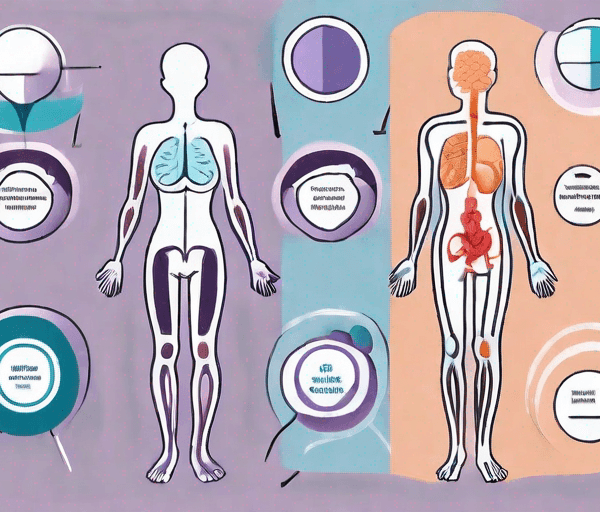In today’s fast-paced world, digestive disorders have become increasingly common. One such disorder that affects millions of people worldwide is known as Irritable Bowel Syndrome, or IBS. Recognizing the signs and symptoms of IBS is crucial for early detection and effective management of this condition. In this article, we will delve deep into the world of IBS to decode its symptoms and help you gain a comprehensive understanding of this common digestive disorder.
Understanding IBS: An Overview
To begin our journey into the world of IBS, it is important to first understand what Irritable Bowel Syndrome is. Simply put, IBS is a chronic gastrointestinal disorder that affects the functioning of the large intestine, or colon. This disorder is characterized by a variety of symptoms, including abdominal pain, bloating, and changes in bowel habits.
While IBS is a common condition, its exact cause remains unknown. Researchers believe that a combination of factors, including abnormal muscle contractions in the colon and increased sensitivity to food and stress, may contribute to the development of IBS.
Let’s delve deeper into the intricacies of Irritable Bowel Syndrome and explore its various aspects.
What is Irritable Bowel Syndrome (IBS)?
IBS is a chronic disorder that affects the large intestine. It is characterized by a variety of symptoms, including abdominal pain, bloating, and changes in bowel habits. The exact cause of IBS is unknown, but factors such as abnormal muscle contractions and increased sensitivity to food and stress may contribute to its development.
When it comes to the symptoms of IBS, they can vary from person to person. Some individuals may experience predominantly diarrhea, while others may have constipation as the primary symptom. There are also cases where individuals may alternate between diarrhea and constipation.
In addition to these core symptoms, IBS can also cause discomfort and pain in the abdomen, which may range from mild to severe. This pain is often relieved by bowel movements. Bloating and excessive gas are also common symptoms experienced by individuals with IBS.
It is important to note that IBS is a chronic condition, meaning that it is long-lasting and may require ongoing management. However, with the right treatment and lifestyle changes, individuals with IBS can lead a fulfilling life.
Prevalence of IBS Globally
IBS is a global health concern, with millions of people worldwide suffering from this condition. In fact, it is estimated that around 10-15% of the population experiences IBS-related symptoms at some point in their lives. Women are more prone to develop IBS compared to men, and the condition often begins in early adulthood.
Geographically, the prevalence of IBS varies across different regions. Studies have shown that Western countries tend to have higher rates of IBS compared to developing nations. This could be attributed to factors such as diet, lifestyle, and access to healthcare.
It is worth mentioning that the impact of IBS goes beyond the physical symptoms. Living with a chronic condition like IBS can have a significant impact on an individual’s quality of life. The unpredictable nature of the symptoms, the need to constantly be aware of triggers, and the potential for social and emotional challenges can all contribute to the overall burden of the condition.
As we continue our exploration of IBS, we will dive into the various treatment options available, lifestyle modifications that can help manage symptoms, and the latest research advancements in the field. Stay tuned for more fascinating insights into the world of Irritable Bowel Syndrome.

The Science Behind IBS
Now that we have a basic understanding of IBS, let’s explore the scientific aspects of this condition. The digestive system plays a crucial role in IBS, and understanding its mechanisms can help us grasp how IBS affects digestion.
The Role of the Digestive System
The digestive system is responsible for breaking down food and absorbing nutrients. It consists of a series of organs, including the esophagus, stomach, small intestine, and large intestine. Each of these organs has a specific function that contributes to the overall process of digestion.
The esophagus, for example, is a muscular tube that transports food from the mouth to the stomach through a process called peristalsis. The stomach, on the other hand, secretes digestive enzymes and acids to break down food into smaller particles. The small intestine is where the majority of nutrient absorption takes place, while the large intestine, also known as the colon, is primarily responsible for the absorption of water and the formation and elimination of stool.
In the case of IBS, the large intestine is the organ primarily affected. This means that the normal functioning of the colon is disrupted, leading to a variety of symptoms that characterize IBS.
How IBS Affects Digestion
IBS disrupts the normal functioning of the digestive system, resulting in a range of symptoms. The irregular contractions of the colon can lead to episodes of diarrhea or constipation, or even alternate between the two. This unpredictable pattern of bowel movements can cause significant discomfort and affect the quality of life for individuals living with IBS.
When the colon contracts too frequently or too forcefully, it can result in diarrhea. This occurs because the rapid movement of stool through the colon does not allow enough time for water to be absorbed, leading to loose and watery stools. On the other hand, when the colon contracts too slowly or weakly, it can result in constipation. In this case, the stool moves too slowly through the colon, allowing excessive water absorption and resulting in hard and dry stools.
In addition to changes in bowel habits, IBS can also cause abdominal pain and bloating. These symptoms may vary in intensity and can be triggered by certain foods, stress, or hormonal changes. The exact mechanisms behind these symptoms are not fully understood, but it is believed that the hypersensitivity of the colon and the abnormal contractions play a role in their development.
Abdominal pain in IBS is thought to be caused by the heightened sensitivity of the nerves in the colon. Even normal contractions of the colon can be perceived as painful by individuals with IBS. Bloating, on the other hand, is believed to be a result of excessive gas production or impaired gas transit through the digestive system.
It is important to note that IBS is a complex condition, and its exact cause and mechanisms are still not fully understood. However, by studying the science behind IBS, researchers and healthcare professionals are continuously working towards a better understanding of this condition and developing effective treatment strategies.
Recognizing IBS Symptoms
Now that we have a solid foundation of knowledge regarding IBS, let’s dive deeper into the symptoms associated with this condition. Recognizing these symptoms is crucial for early detection and appropriate management of IBS.
IBS, or Irritable Bowel Syndrome, is a chronic gastrointestinal disorder that affects millions of people worldwide. It is characterized by a combination of physical and psychological symptoms that can significantly impact a person’s daily life.
Common Physical Signs of IBS
Individuals with IBS often experience physical symptoms that can significantly impact their daily lives. The most common physical signs of IBS include abdominal pain or discomfort, bloating, and changes in bowel habits.
The abdominal pain associated with IBS is typically relieved by passing stool or having a bowel movement. This pain can range from mild to severe and may be accompanied by cramping or a sensation of pressure in the abdomen.
Bloating is another common symptom, leading to a feeling of fullness, tightness, or distension in the abdomen. It can be particularly bothersome and may cause clothes to feel tight or uncomfortable.
In terms of bowel habits, individuals with IBS may experience bouts of diarrhea, constipation, or both. These changes in bowel habits can be accompanied by urgency or a feeling of incomplete evacuation. It is not uncommon for individuals with IBS to alternate between periods of constipation and diarrhea, which can further disrupt their daily routine.
Other physical symptoms that may be associated with IBS include excessive gas, mucus in the stool, and a feeling of heaviness in the lower abdomen. These symptoms can vary in intensity and frequency from person to person.
Psychological Symptoms Associated with IBS
It is important to note that IBS is not solely a physical condition. Many individuals with IBS also experience psychological symptoms, including anxiety and depression. These psychological symptoms can be secondary to the physical discomfort associated with IBS or may be intricately linked to the underlying mechanisms of the disorder.
Living with the chronic pain and unpredictable nature of IBS can take a toll on a person’s mental well-being. The constant worry about symptoms, fear of embarrassing situations, and the impact on social activities can contribute to feelings of anxiety and depression.
Stress and anxiety can worsen the symptoms of IBS, and vice versa, creating a vicious cycle. It is essential for individuals with IBS to address both the physical and psychological aspects of their condition for effective management and improved quality of life.
Various coping strategies, such as relaxation techniques, cognitive-behavioral therapy, and support groups, can help individuals with IBS manage their psychological symptoms and reduce the impact on their daily lives.
In conclusion, recognizing the symptoms of IBS is crucial for early detection and appropriate management of this chronic condition. By understanding the physical and psychological aspects of IBS, individuals can take proactive steps towards managing their symptoms and improving their overall well-being.
Differentiating IBS from Other Digestive Disorders
IBS shares several symptoms with other digestive disorders, making it important to differentiate it from conditions that require different treatment approaches. Let’s explore how IBS differs from two common digestive disorders: Inflammatory Bowel Disease (IBD) and Gastroenteritis.
IBS vs. Inflammatory Bowel Disease
Inflammatory Bowel Disease (IBD) refers to a group of chronic inflammatory conditions that affect the digestive tract. The two main types of IBD are Crohn’s disease and ulcerative colitis. While IBD and IBS share some symptoms, they are distinct conditions with different underlying mechanisms and treatment approaches.
Unlike IBS, IBD involves inflammation of the digestive tract and can cause more severe symptoms, such as rectal bleeding, weight loss, and malnutrition. In addition, IBD is characterized by specific changes in the lining of the intestine that can be identified through medical imaging and laboratory tests.
IBS vs. Gastroenteritis
Gastroenteritis, also known as the stomach flu, is an inflammation of the stomach and intestines typically caused by a viral or bacterial infection. While IBS and gastroenteritis share symptoms such as abdominal pain, diarrhea, and vomiting, they differ in terms of their duration and underlying cause.
Gastroenteritis is usually acute, with symptoms resolving within a few days to a week. In contrast, IBS is a chronic condition that can persist for months or even years. Additionally, gastroenteritis is typically caused by an infectious agent, while IBS does not have a single identifiable cause.

The Importance of Early Detection
Early detection of IBS is essential for effective management and improved quality of life for individuals living with this condition. Let’s explore the potential complications of untreated IBS and how early detection can make a significant difference.
Complications of Untreated IBS
When left untreated, IBS can lead to a range of complications that can significantly impact an individual’s well-being. Chronic abdominal pain and discomfort can affect a person’s ability to engage in daily activities and may lead to decreased productivity and social isolation.
In severe cases, untreated IBS can also cause malnutrition and weight loss, as the body may have difficulty absorbing nutrients properly. Psychological complications, such as anxiety and depression, are also common in individuals with unmanaged IBS, further impacting their quality of life.
How Early Detection Can Improve Quality of Life
Early detection of IBS allows for prompt intervention and appropriate management strategies tailored to each individual’s needs. Lifestyle modifications, such as dietary changes and stress management techniques, can be implemented early on, potentially alleviating symptoms and improving overall well-being.
In addition to lifestyle modifications, healthcare professionals may prescribe medications to help manage specific symptoms of IBS, such as antispasmodics for abdominal pain or laxatives for constipation. Psychological support, including therapy or counseling, may also be beneficial in addressing the psychological symptoms commonly associated with IBS.
In Conclusion
Decoding IBS symptoms is crucial for recognizing the signs of this common digestive disorder. By understanding the fundamentals of IBS, including its symptoms, its impact on digestion, its differentiation from other digestive disorders, and the importance of early detection, individuals can take control of their health and seek appropriate management strategies.
Remember, if you suspect you may be experiencing symptoms of IBS, consult with a healthcare professional for a proper evaluation and personalized treatment plan.



